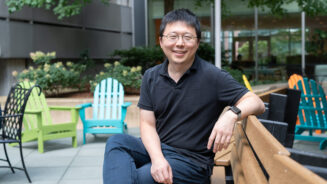Ushering in a New Era for Therapeutics

In modern medicine, the term “drug” typically refers to small molecules that are targeted to specific proteins to either cure or alleviate health conditions. Drug development and adoption over the past century have lengthened lives and improved the quality of life for hundreds of millions of people.
However, discovering these targeted molecules—which make up about 90% of the drugs on the market today—is a lengthy and enormously expensive process. Most therapeutic medications discovered to date have either been lucky accidents or large-scale development projects. And for all their success, most of these target only a single molecule or molecular change.
Feng Zhang is convinced there is another, potentially better, way to develop therapeutics; one based on our rapidly increasing knowledge about the nature of the human genome and cellular mechanisms that underlie disease. Zhang, a world-renowned molecular biologist at the Broad Institute of MIT and Harvard, pioneered use of the revolutionary genome-editing tool CRISPR (clustered regularly interspaced short palindromic repeats) in human cells. Building on that breakthrough work, Zhang is now developing new modular programmable tools—comprising a therapeutic ‘payload’ and a delivery vehicle—that will give researchers the ability to design and deliver gene-editing therapies that can modify cells to treat a wide range of diseases. The result will be a toolbox of customizable gene-editing components that can be deployed to reprogram cells, a paradigm shift from the traditional one-disease-at-a-time drug discovery approach.
Griffin Catalyst’s seed support allows Zhang and his team to accelerate this work, which is already showing remarkable early promise.
WHO WE’RE SUPPORTING
Born in China before emigrating with his family at the age of eleven to the United States, Feng Zhang studied chemistry as an undergraduate at Harvard College and then completed his Ph.D. in chemistry at Stanford University. His impressive resume speaks for itself: a core member of the Broad Institute and an investigator at the Howard Hughes Medical Institute. At MIT, Zhang is the James and Patricia Poitras Professor of Neuroscience, with joint appointments in the departments of Brain and Cognitive Sciences and Biological Engineering, as well as an investigator at the McGovern Institute for Brain Research. Indeed, he has been described as “a once-in-a-generation scientist who sees connections that the rest of us have overlooked,” by Robert Desimone, director of the McGovern Institute, who adds, “by seeing those new connections, he’s able to make these gigantic new discoveries.”
Zhang’s programmable therapeutics initiative expands upon his earlier work in CRISPR gene editing—a remarkable technology that allows geneticists and researchers to edit the genome in living organisms by cutting and inserting DNA sequences at specific locations. Adapted in the laboratory from naturally occurring systems found in bacteria, CRISPR, an incredibly accurate and useful gene modification technique, is already regarded as one of the greatest scientific advances of the 21st century; The first CRISPR-based gene therapy was approved for use in patients last year.
But there is much more to be done. Though gene-editing therapies rely on CRISPR to make accurate changes in the genome, this system still has several limitations, such as size and unintended side effects, and clinicians need more effective tools to precisely modify the human genome and treat disease. The next step, currently being pursued by the Zhang lab, is to mine natural diversity and find novel gene-editing systems with useful DNA-modifying capabilities that provide a powerful starting point for programmable tools and therapeutics.
Zhang and his team have begun by tackling two longstanding challenges in gene editing. The first is developing therapies that can rewrite the human genome by integrating large stretches of DNA into precise locations—a key capability for inserting a missing gene or swapping out a mutated gene with the corrected one. The second is accurately targeting therapies to specific cells in the body, without triggering a cascade of harmful side effects. “The cells in our body are like a computer,” Zhang observes. “In disease, when cells have errors, the computer, or body, crashes. Our idea is to install programs on the computer to prevent crashes.”
WHY IT MATTERS
Recently, the U.S. Food and Drug Administration approved the first-ever CRISPR-based gene therapy for the treatment of two genetic blood disorders: sickle cell disease and beta-thalassemia. This extraordinary milestone exemplifies how gene-editing technologies like CRISPR are transforming how we treat—and even cure—disease.
But the programmable therapeutics that Zhang and his team are now developing have the potential to successfully address the root causes of a wider range of conditions, from neurodegenerative disorders to cancers and congenital blindness. Overall, programmable therapeutics can revolutionize biomedicine, allowing millions of people to live longer and healthier lives.
WHAT’S THE IMPACT
To accelerate the impact of these discoveries, Zhang has already made his research and techniques widely available to scientists—especially biomedical researchers—around the world.
Meanwhile, Zhang and his team continue work on their ultimate goal of building a flexible, highly usable platform for programmable therapeutics whose scale and efficiencies far exceed today’s capabilities. His goal is to push beyond the current practice of tackling one disease at a time by creating an entire suite of technologies that allow the customization of gene- or cell-based therapies to reprogram cells and thereby fix the underlying causes of numerous genetic diseases.
For Griffin Catalyst, support of Zhang’s work embodies its overall approach to advancing medical research: a commitment to investing early in high-potential science, with the recognition that the development of the breakthroughs that will define the next century may take years or even decades. By accelerating that process through formative, early-stage gifts, Griffin Catalyst hopes to bring about a healthier future for all, sooner.
